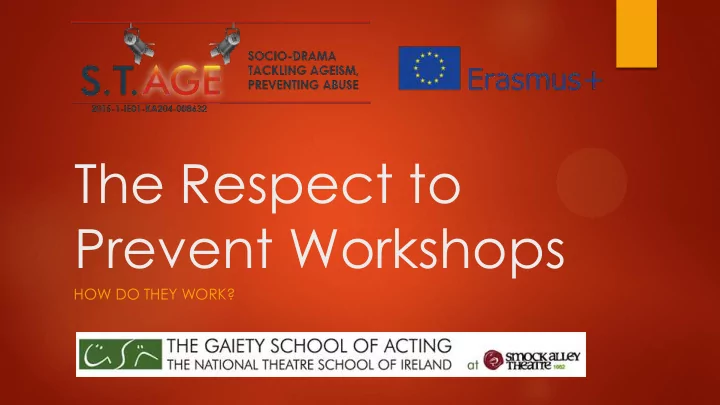

The Respect to Prevent Workshops HOW DO THEY WORK?
How are the workshops informed? Drama techniques and Sociodrama – Creative Process Pre-piloting interviewing – Older Adults, Formal Carers/Health Professionals Hierarchy of Human Needs (Abraham Maslow 1954) & Human Rights Pre-piloting Workshops Train the Trainer Sociodrama – In action
Drama techniques & Sociodrama – Creative Process The ‘Respect to Prevent’ workshops envisaged by the project will offer a modality of learning through experiential process Creative Drama is an exploratory tool used with other multi- disciplinary methods to promote and achieve change. Creative Drama, in its development, has expanded to meet the needs and demands of our ever changing social and cultural climate. Social Drama is now a developing and fundamentally important tool in increasing social awareness.
What strands will be used in the development, implementation and delivery of the S.T.Age Programme? Forum Theatre Sociodrama
S0CIODRAMA is based on the work of Dr Jacob Levy Moreno (1889-1974), who is also known for his creation of psychodrama Psychodrama Sociodrama Focuses on the internal Focuses on individuals in the interactions of one process of interaction person A group action dealing with Attention on the relations individual and their The subject is the group private problems Grouped by social, cultural and Unfolded before a group professional roles e.g. Individual centred and Carers/Older Adults concerned with a group of private individuals Focusing on spontaneity operating in the A therapeutic intervention based on the present. Propelling the group toward an client’s personal historical experience with adequate response to a new stimuli or a the intention of bringing personal catharsis new response to an old one and insights.
Workshop 1 Workshop 2 INFORMATIVE The Transformative TRANSFORMATIVE ‘Empowerment Workshops 2 & 3 Empowerment through Human through Education’ Follow a prescribed Rights Activation route to raise awareness amongst older people of their Human Rights, empowering them to exercise these rights & challenge ageist attitudes. Building Empathy amongst health & Workshop 4 social care professionals to ‘walk Workshop 3 REFORMATIVE in older peoples’ Evaluation of outcomes TRANSFORMATIVE shoes’ (Generational Design/Update Policy Nurturing Empathy Intelligence). Promoting Self-Care
Pre-piloting explorative interviews: Qualitative Research Over 40 older people and health/social care professional were interviewed to ascertain a consensus of opinion and level of understanding within 4 main areas; Human Rights Empowerment Empathy Well-being & Self-care
A common language on Human Rights Where Human Needs & Rights meet
Workshop STEP 3 Need to be self fufilled, learn, create, understand and experience ones potential. (Severely restricted the older we become) Empowerment Dignity Workshop STEP 2 Need for affection, feelings of belongingness, and meaningful relations with others. Need to be well thought of by oneself and others Empathy (GI) Sociodrama Workshop STEP 1 Basic Needs: Oxygen, Food, Water, Rest. Establishing a Need for shelter and freedom from harm and danger Common Language
The Pre-piloting Workshops Workshops took place in July 2016 FEEDBACK OLDER ADULTS ‘Helped me speak up for myself and still be able to agree with others.’ ‘I really enjoyed the session. Good to get so many points of view.’ ‘I learned more about old age and ageism. I understand more now.’
FEEDBACK CARERS & HEALTHCARE PROFESSIONALS WORKSHOP ‘Everyone should be encouraged to experience this training as it is very helpful. It is going to be beneficial for both residents and staff. An excellent form of team building.’ ‘I thought it was really interesting and everything makes sense. The facilitators were great and explained everything really well. They made us feel comfortable immediately.’ ‘I felt the training was excellent and is very important for my work. The roleplay with the trainers was excellent too. We, as carers could stop them when we felt they were not being respectful to the residents’ needs. Very enjoyable workshop.’ ‘Very enjoyable and educational for my role as a healthcare assistant. Fun way of training.’ TRAIN THE TRAINER WHAT NEXT?
SOCIODRAMA is a form of social theatre based on action techniques in which each participant assumes and dramatizes a variety of roles, usually focusing on problems and conflicts arising in group situations Types – ‘Crisis’, ‘Diversity’ & ‘Political’ Forum Theatre (Agusto Boal) empowers the audience to actively explore different options for dealing with shared problems and motivates them to make positive changes in their own lives. It is a shared experience that stimulates debate, communication and understanding of different perspectives in word and motion EXAMPLE – Sociodrama & Forum Theatre in action
The Respect to Prevent Workshops HOW DO THEY WORK? PRESENTED BY SEAMUS QUINN (GSA)
Recommend
More recommend